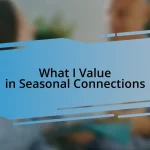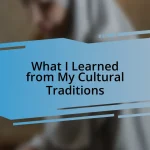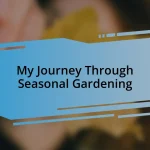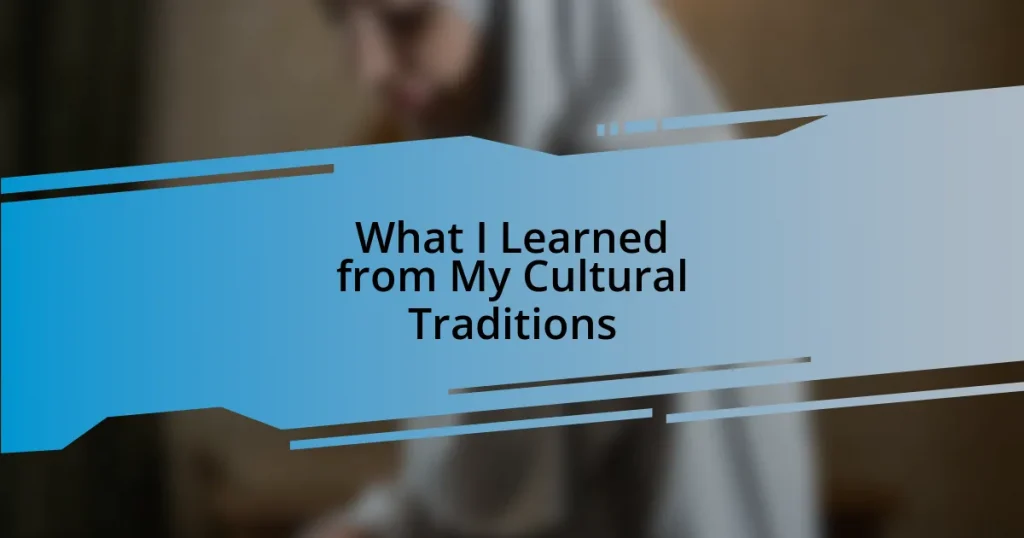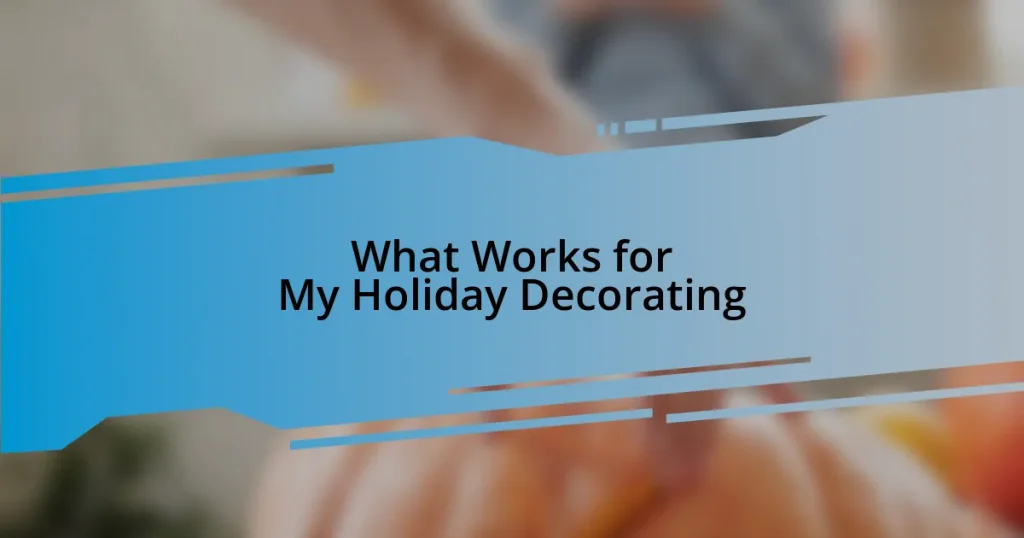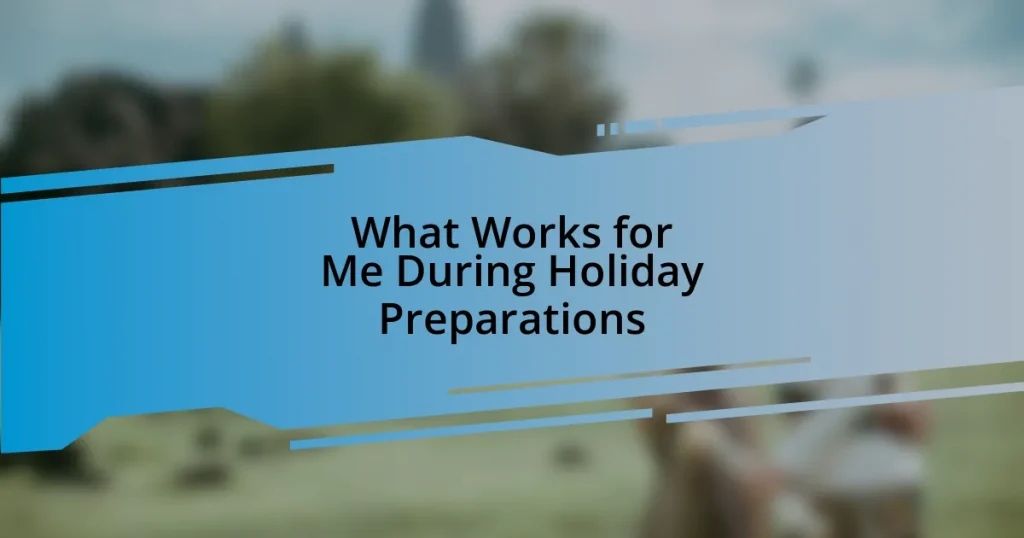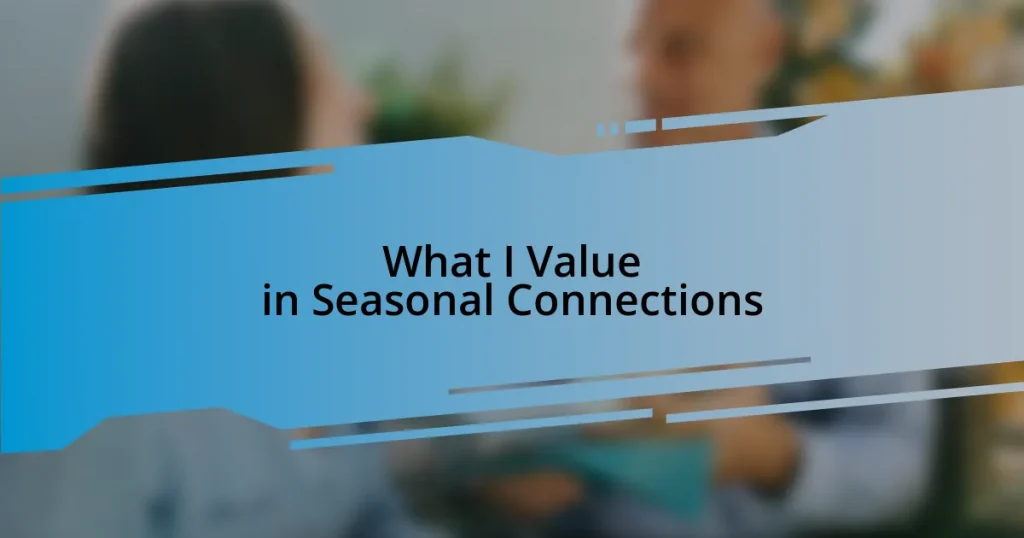Key takeaways:
- Cultural traditions create a sense of identity, belonging, and community through shared experiences, such as festivals and family gatherings.
- Personal experiences with cultural practices, like joining diverse celebrations, deepen understanding and appreciation of different heritages.
- Embracing traditional values and rituals in modern life can strengthen relationships and foster connections with family and community.
- Active celebration of cultural diversity promotes empathy and understanding, bridging gaps between different backgrounds through shared stories and experiences.
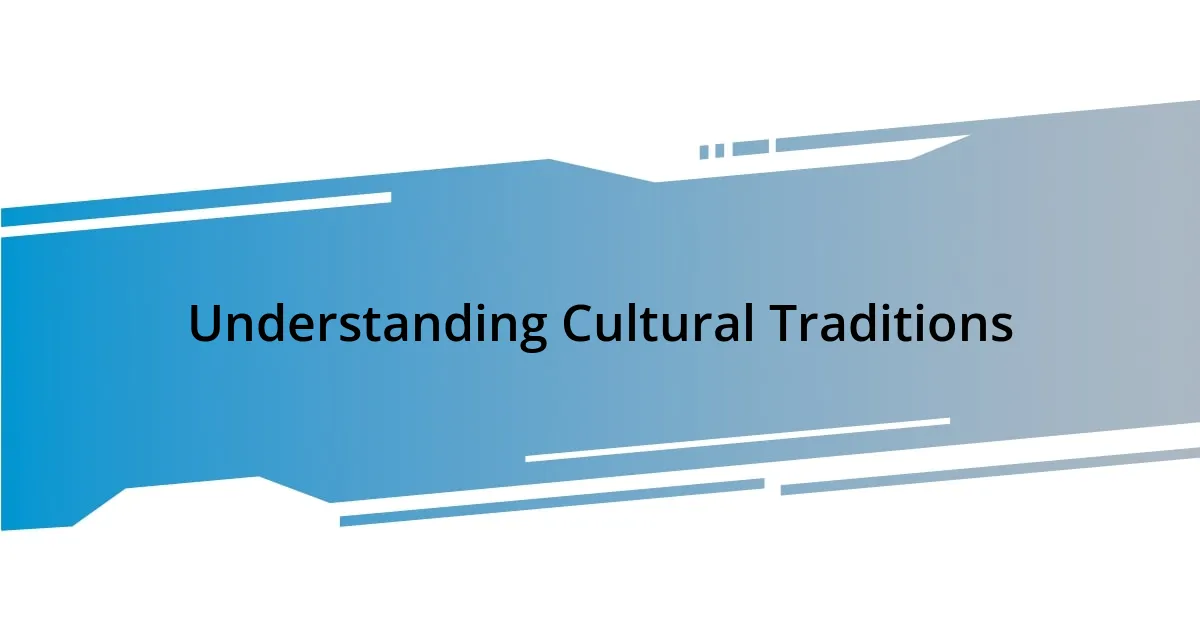
Understanding Cultural Traditions
Cultural traditions are like threads woven into the fabric of our identities. I remember sitting around the dinner table as a child, filled with the rich aromas of spices from my family’s recipes, each dish telling a story of my heritage. Isn’t it fascinating how food can be a bridge to understanding our ancestors’ struggles and triumphs?
Every tradition carries with it a set of values that shape our perspectives and interactions. For example, my family’s annual celebration of festivals instilled in me a sense of community and belonging. Have you ever felt that warmth of connection when participating in a ritual that brings everyone together, regardless of their backgrounds?
Delving into cultural traditions can sometimes feel overwhelming, with so many customs to grasp and appreciate. There were moments when I struggled to balance my modern lifestyle with the expectations of my cultural practices. Yet, embracing those traditions often led me to profound realizations about who I am and the legacy I carry forward. How have your own cultural experiences shaped the way you view the world?
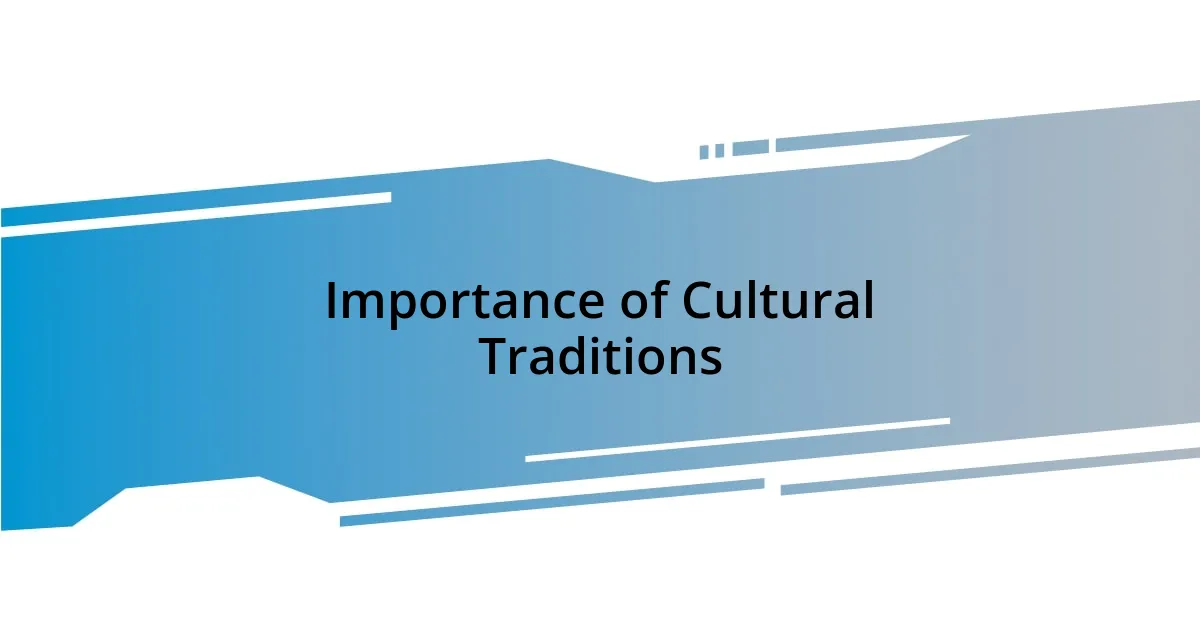
Importance of Cultural Traditions
Cultural traditions play a crucial role in maintaining the identity of a community. Growing up, I cherished the moments spent during Lunar New Year, where the vibrant dragon dances and the sounds of firecrackers filled the streets. These festivities weren’t just about celebration; they connected me to generations before me, weaving a tapestry of shared joy and resilience. Can you remember a festival that made you feel deeply connected to your roots?
They also serve as a bridge across generations, fostering an understanding between the young and old. During my childhood, attending traditional storytelling sessions with my grandparents opened my eyes to the values they instilled through tales of courage and wisdom. It made me realize that preserving these stories is essential for instilling a sense of purpose and direction in younger generations. How do the stories from your elders shape your understanding of life?
Furthermore, cultural traditions contribute to a sense of belonging, creating bonds within a community. I’ll never forget the warmth I felt during my family’s Harvest Festival, where everyone came together to share food and laughter. In those moments, I learned that these gatherings strengthen relationships, nurturing a network of support and love. Have you felt that same sense of unity during community events in your own life?
| Cultural Traditions | Importance |
|---|---|
| Unity | Bringing people together fostering connections |
| Identity | Shaping individual and community identity |
| Legacy | Transmitting values and stories across generations |
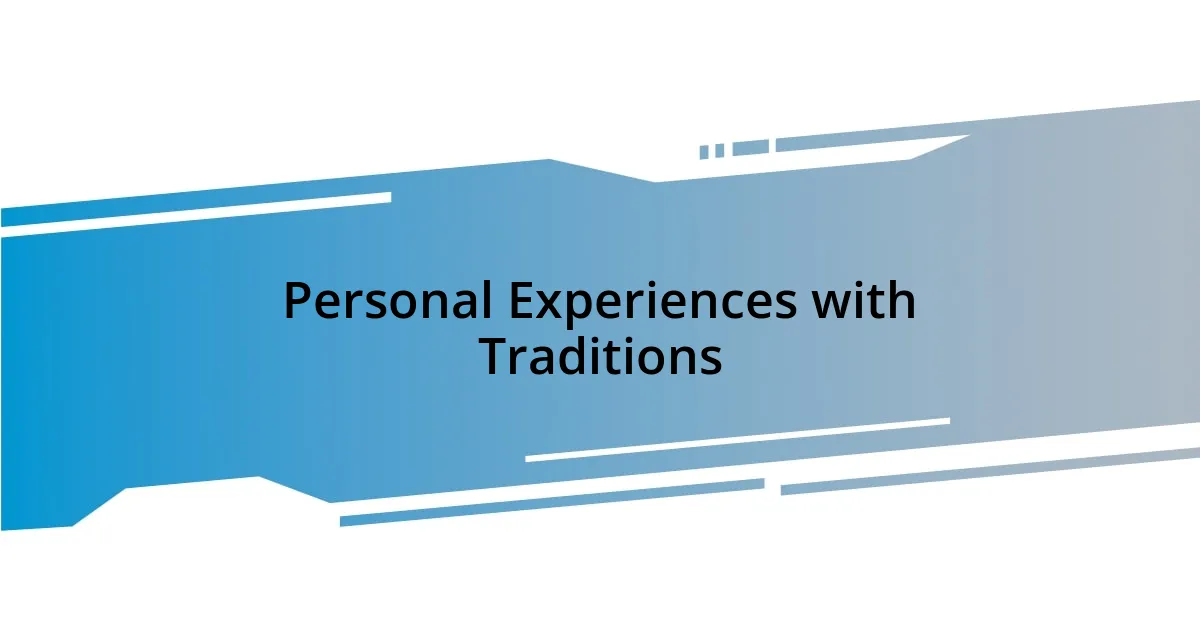
Personal Experiences with Traditions
Experiencing cultural traditions has been a journey of discovery for me. I vividly recall the first time I participated in Diwali celebrations with my friends. It was more than just lighting diyas; it was the laughter of children, the shared sweets, and the warmth of friendships that made the evening unforgettable. As I immersed myself in the festivities, I felt a powerful sense of belonging that transcended my own cultural background.
Here are some key moments from my experiences:
- Family Gatherings: The joy and laughter around the table during Eid are unmatched, as we come together to share not only food but also stories from our lives.
- Rituals and Remembrance: Lighting a candle on Yom Kippur for those we’ve lost taught me the importance of honor and remembrance in our traditions.
- Cultural Exchange: When I joined my friend’s Quinceañera, I gained insights into the significance of rites of passage, broadening my understanding of celebration across cultures.
Each of these experiences has shaped me, teaching me the significance of shared values and the beauty inherent in cultural practices.
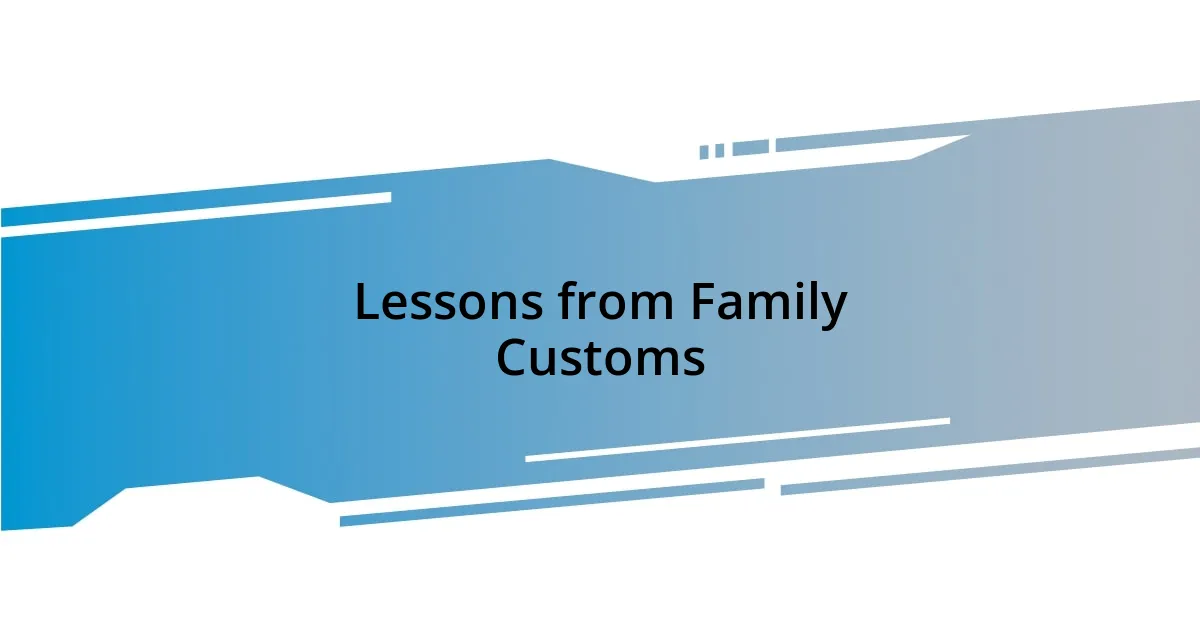
Lessons from Family Customs
One lesson I’ve learned from family customs is the importance of sacrifice and gratitude. During the annual family reunion, I remember my grandmother sharing stories about how she would give up her favorite meals to ensure everyone else had enough. That act of selflessness not only filled our plates but also our hearts. Have you ever experienced a moment where giving something up for others made the celebration more fulfilling?
Another insight came from the way we celebrate weddings in my family. Each ceremony is a vibrant display of culture and values. I observe how my aunts would gather to create hand-stitched decorations, pouring in hours of love and effort. This taught me that beauty lies not just in the end result but in the labor of love behind it. Have you noticed how such acts of care transform an event?
Finally, the ritual of storytelling around the fireplace on cold winter nights made me realize the power of communication. One night, as my dad recounted tales of his youth, I felt a deep sense of connection to my family’s history. It reminded me that through sharing our narratives, we breathe life into our traditions and foster empathy. Have you found that storytelling helps bridge gaps between generations in your family?
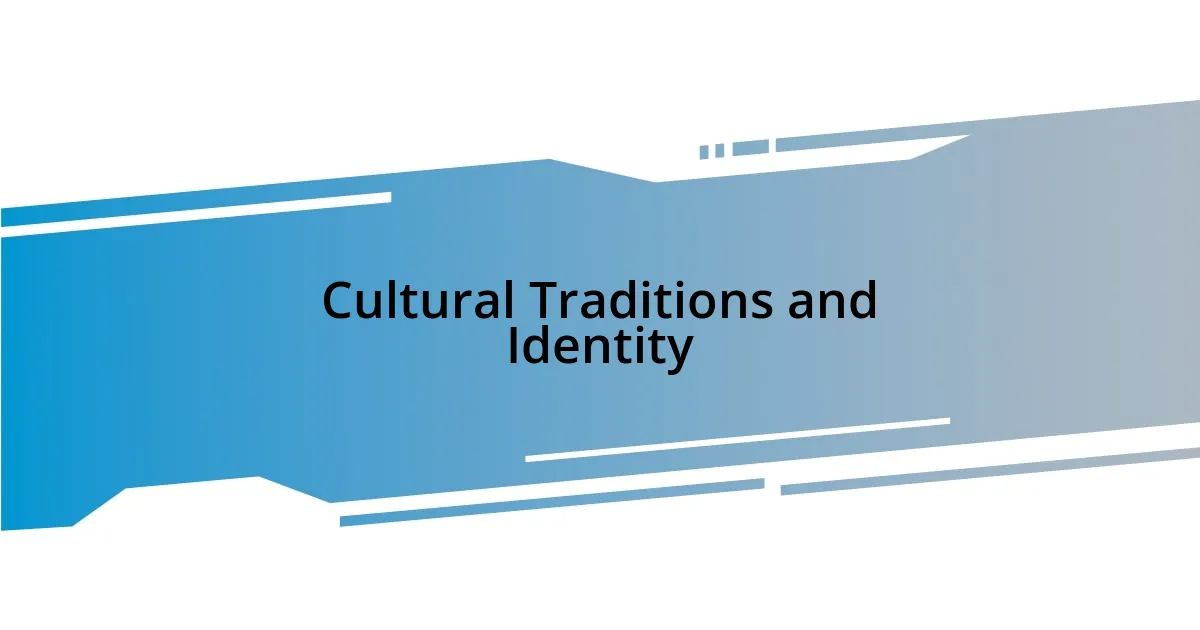
Cultural Traditions and Identity
Cultural traditions play a crucial role in shaping our identities, offering a deep well of shared experiences. One vivid memory comes to mind: when I traveled to my ancestral village for a festival, the vibrant colors, rhythmic music, and stories exchanged among generations made me feel an undeniable connection to my roots. Have you ever felt that rush of recognition when you step into a place that feels like home, even if you’ve never been there before?
In another instance, I remember standing in my grandmother’s kitchen, watching her prepare recipes that had been passed down for generations. The aroma wafting through the air filled me with nostalgia and a profound sense of belonging. It struck me that food isn’t just sustenance; it’s a thread weaving together my family’s history and values. How powerful is it that a single dish can evoke memories and connect us to our ancestors?
As I reflect on my experiences, I realize that each cultural tradition serves as a mirror of identity, guiding us through life’s complexities. Participating in ceremonies like Lunar New Year celebrations has not only provided joy but also clarity about my place in the world. The values, hopes, and dreams shared among family members during these gatherings have shaped my perspectives. Have you ever felt your identity evolve during such cherished moments?
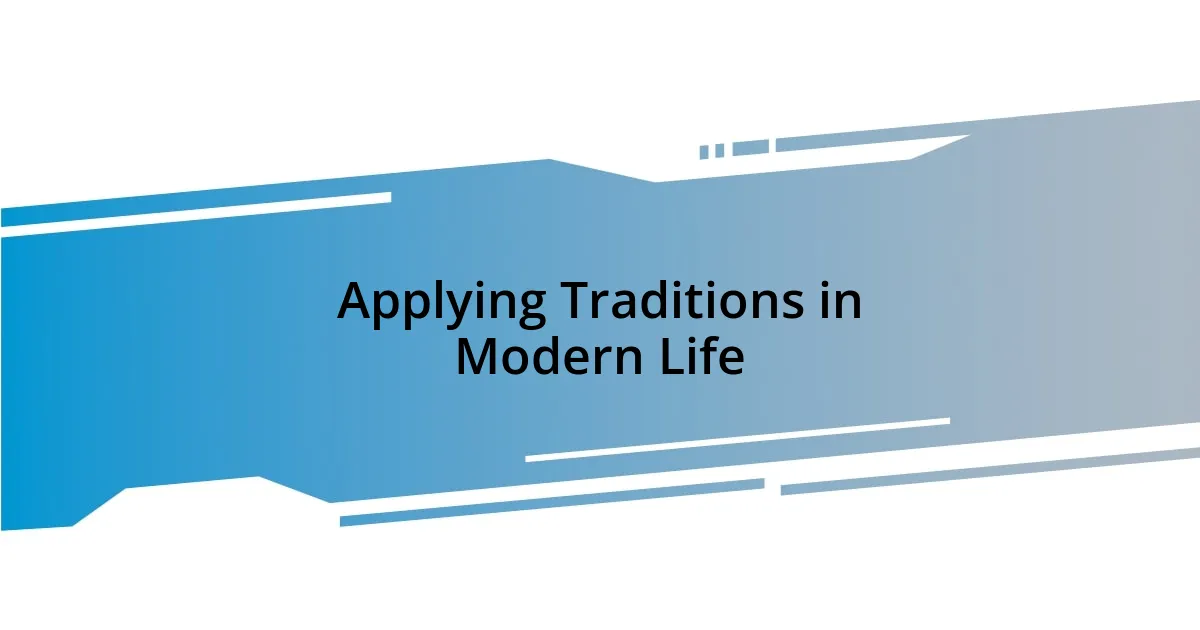
Applying Traditions in Modern Life
In my daily life, I strive to incorporate traditional values, especially during special occasions. For instance, during Thanksgiving, I revive the practice of going around the table to share what we are grateful for. This simple act transforms a meal into a profound expression of appreciation, reminding us to pause and reflect. Have you ever noticed how such moments deepen our connections with one another?
Furthermore, I find that traditional crafts can enhance modern living. Last summer, I decided to learn embroidery from my mother, a skill she inherited from her grandmother. As I stitched a decorative piece for my home, I felt an overwhelming sense of pride and continuity. It dawned on me that integrating these handcrafted details allows me to weave my heritage into my décor, creating a warm and inviting space. Have you thought about how your cultural crafts could personalize your surroundings?
Even in everyday interactions, I apply traditional greetings and phrases that reflect respect and kindness. Recently, I was chatting with a neighbor and opted to greet her with a traditional salutation rather than a casual “hi.” It sparked a rich conversation about our backgrounds, revealing shared experiences that I hadn’t expected. In what ways do you think traditional language can open up dialogues about our diverse histories?
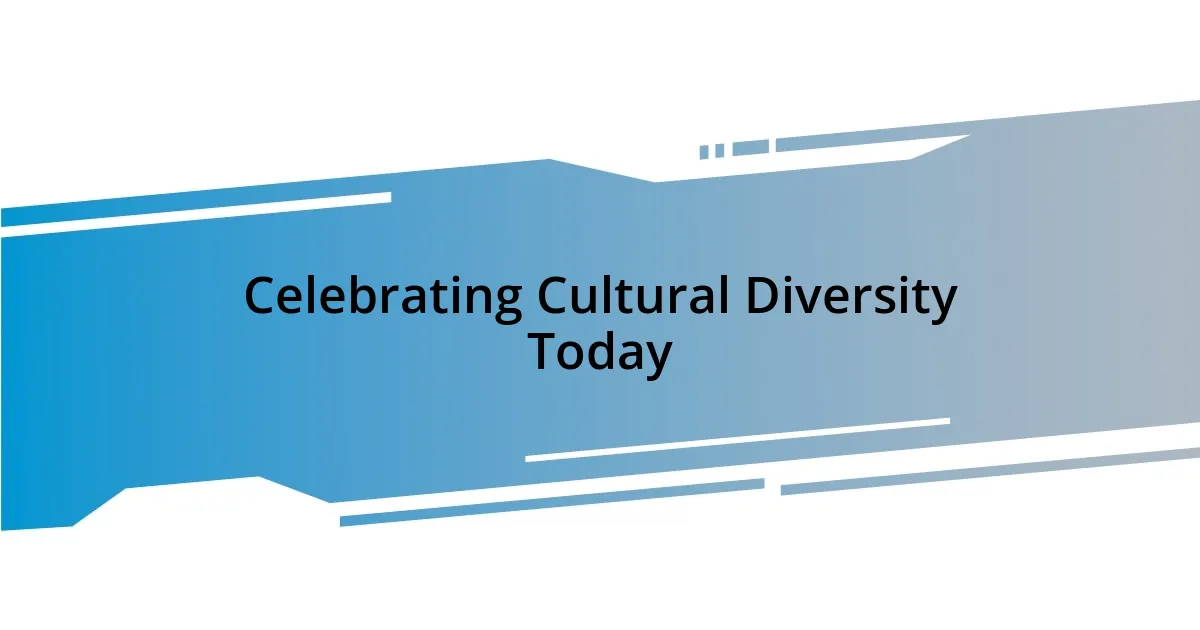
Celebrating Cultural Diversity Today
Cultural diversity is something I find myself celebrating every day. Just last week, I attended a local cultural fair that showcased various traditions through food, music, and dance. I vividly recall the feeling of joy as I watched dancers in traditional attire perform, inviting me to join in. It felt like a celebration of unity, as people of all backgrounds gathered to appreciate the richness of each other’s heritage. Isn’t it amazing how shared experiences can foster a sense of community?
One particularly poignant moment occurred while I was sampling dishes at a communal table. I struck up a conversation with someone from a different cultural background, and we started exchanging family recipes. It was eye-opening to realize how many similarities we had, yet our backgrounds were worlds apart. Sharing those culinary stories made me reflect on how food transcends borders and connects us in unexpected ways. Have you ever bonded with someone over a simple meal, discovering cultural ties that surprise you?
Now more than ever, I believe we need to actively celebrate our differences, especially in our globalized world. Whether through virtual gatherings or community events, I feel that every story shared and tradition showcased adds to a tapestry of understanding and respect. The more we learn about each other’s cultural practices, the more empathetic we become. Reflecting on this, how can we, as individuals, be intentional in creating spaces that honor diversity in our everyday lives?



